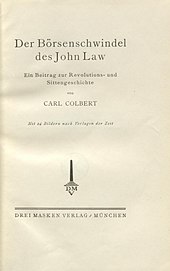Karl Colbert
Karl Colbert , also Carl Colbert, (born as Karl Cohn, February 8, 1855 in Vienna , Austrian Empire ; died May 29, 1929 there ) was an Austrian writer , journalist and editor . He also wrote under the pseudonyms Alpheus, Augias, Katilina.
Life
Karl Cohn was a son of the medium-sized Viennese banker Moritz Cohn and Charlotte Hirsch. His father died early and the mother carried on the business for a while. Cohn attended a high school and the Vienna Commercial Academy . He first worked in his parents' exchange office and went into journalism after it was sold . In 1881 he changed his name to Colbert. With Ernst Ziegler he founded the illustrated magazine Wiener Mode around 1887 . In 1898 he worked as a columnist for the Viennese weekly Die Wage . In 1910 he and Maximilian Schreier founded the Monday newspaper Der Morgen. Wiener Montagblatt . In 1915 he published a collection of articles under the title Dawn .
In 1915 Colbert founded the socialist daily Der Abend , in which young journalists such as Bruno Frei and Else Feldmann were able to publish their first socially critical reports. The newspaper was banned by the censors several times during the First World War .
Colbert published the monograph Bankers and Stock Market Players 2000 Years Ago in 1924 . 1925 was published in the newspaper Arbeiterwille the serial novel The Golden Calf , the book was printed the following year. In 1927 Colbert wrote a report on the 18th century John Law stock market fraud .
Colbert, his son Ernst Colbert (1891-1943), who became the publisher of the evening in 1928 , and its editor-in-chief Alexander Weisz were involved in cases of corruption that were scandalized by the political public . Colbert split from his successful editor Weisz, and the two then publicly fought out their private feud. He also came into conflict with the Social Democratic Labor Party , of which Colbert was a member, and its press .
Bruno Frei paid tribute to Colbert in the Berlin Weltbühne with a detailed obituary.
Fonts (selection)
- (anonymous): Etiquette questions: the laws of the etiquette for civil society. From the mailbox man of "Wiener Mode" . Vienna: Verlag der "Wiener Mode", [approx. 1895]
- Alpheus: dawn. Pictures from Vienna that was, that is and that we want to create . Vienna: Anzengruber, 1915
- The price drive lawsuit against Dr. Josef Kranz , former President d. General Depository bank in Vienna. With e. Vorw. U. Report on d. Prehistory d. Carl Colbert's criminal case . Leipzig: Suschitzky, 1917
- Bankers and stock market players 2000 years ago. A contribution to the history of morals . Constance: O. Wöhrle, 1924
- The golden calf. A novel from the world of money . Vienna: Wiener Volksbuchhandlung, 1926
- John Law's stock market fraud. A contribution to the history of the revolution and morals . Munich: Drei Masken Verlag, 1927
- Sodom and Gomorrah . Munich: Drei Masken Verlag, 1928
literature
- Colbert, Karl , in: Handbook of Austrian Authors of Jewish Origin, 18th to 20th Century , p. 204
- Colbert, Carl , in: Salomon Wininger : Great Jewish National Biography . Volume 6. Chernivtsi, 1935, pp. 525f.
- Colbert, Carl , in: Renate Heuer (Ed.): Lexicon of German-Jewish Authors . Volume 5, Munich: Saur 1997, pp. 270-272
Web links
- Literature by and about Colbert, Carl in the catalog of the German National Library
- Literature by and about Colbert, Karl in the bibliographic database WorldCat
- Colbert, Carl , at litkult1920er
- Colbert, Carl , at History Vienna
Individual evidence
- ↑ Constantin von Wurzbach : Ziegler, Ernst . In: Biographisches Lexikon des Kaiserthums Oesterreich . 60th part. Imperial and Royal Court and State Printing Office, Vienna 1891, p. 59 ( digitized version ).
- ↑ Ernst Colbert was a victim of the Holocaust, see Colbert, Ernst , at DÖW
- ^ Th. Venus: Weisz, Alexander (1884 – around 1950), journalist. In: Austrian Biographical Lexicon 1815–1950 (ÖBL). Volume 16, Verlag der Österreichischen Akademie der Wissenschaften, Vienna 1957–2013, p. 100 f. (Direct links on p. 100 , p. 101 ).
- ↑ Bruno Frei: Carl Colbert . In: Die Weltbühne, 25 (1929), No. 26, pp. 964–968
| personal data | |
|---|---|
| SURNAME | Colbert, Karl |
| ALTERNATIVE NAMES | Cohn, Karl (maiden name); Alpheus (pseudonym); Augias (pseudonym); Katilina (pseudonym) |
| BRIEF DESCRIPTION | Austrian writer, journalist and editor |
| DATE OF BIRTH | February 8, 1855 |
| PLACE OF BIRTH | Vienna |
| DATE OF DEATH | May 29, 1929 |
| Place of death | Vienna |


